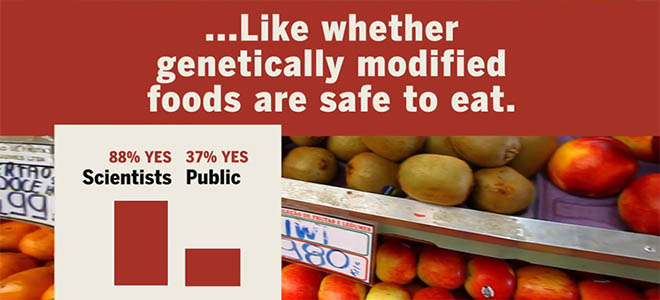Roger Pielke, Jr. quoted in a Christian Science Monitor article:
Study finds wide gulf between public, scientist views about science (+video)
Americans hold science in high regard, but perceive risks and scientific theories very differently from scientists, a new study finds. The public is much more skeptical about the safety of genetically modified foods and pesticides than scientists.
by Pete Spotts
Christian Science Monitor, January 30, 2015
For years, social scientists have tracked the public’s perception of risk from various technologies or their perceptions of well-established scientific theories. A new study from the Pew Research Center takes that a step further to compare public views with those of scientists. Not only do the results find gaps between the two groups. It finds those gaps surprisingly high, but that it cuts across more issues than expected, according to the study’s architects.
The results are raising yellow flags in some circles that public confidence in the United States‘ scientific enterprise, while still high, may be eroding. They are prompting a renewed call for scientists to step out of the lab and into PTA meetings, service organizations, and other groups not as lecturers but as neighbors with a useful perspective to share, especially on issues that have a scientific component to them.
In particular, researchers should be working to find common ground where the science generates “discomfort between science and the rest of society,” says Alan Leshner, chief executive officer of the American Association for the Advancement of Science and the executive publisher of the journal Science. Pew drew on a random sample of just over 2,700 scientists among the AAAS’s US membership for its survey, as well as 2,002 adults picked at random from around the country.
“We only support science if it’s going to pay off in benefits to humankind,” he explains. Unless the public is receptive to what science has to offer and is familiar with what science can and cannot contribute to policy discussions, “the more difficult for society to reap the benefits of science.”
Ironically, the angst comes at a time when public recognition of science’s contributions to society is widespread – a persistent feature of studies gathered regularly by the National Academy of Sciences, as well as this new study. The Pew survey found that 79 percent of adults outside the science community agree that science has made life easier for most people, although the figure is four points lower than it was in 2009. Some 70 percent of adults agree that government spending on engineering and technology, as well as on basic research, at some point pays off. Read more …


